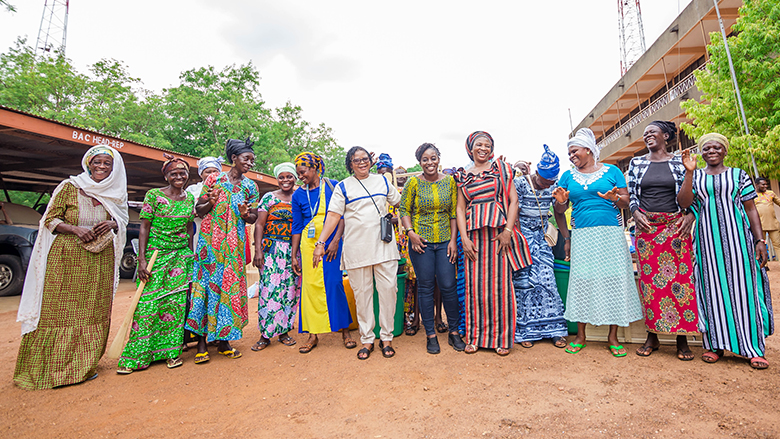
Cash transfer programs have significantly reduced poverty over the years. The World Bank’s Social Protection and Jobs (SPJ) Unit, in collaboration with ideas42 and the government of Ghana, has enhanced these programs with cost-effective behavioural interventions.
Supported by the Global Innovation Fund (GIF), ideas42 worked with the World Bank SPJ in Ghana to integrate behavioural designs into Ghana’s Complementary Livelihood and Asset Support Scheme (CLASS) program, part of the Ghana Productive Safety Net Project.
This partnership led to the successful design and testing of behavioural interventions, confirmed by a large-scale randomized evaluation, and secured government support and funding to expand these interventions to all CLASS participants.
Participants faced many behavioural barriers to consistently saving towards productive investments. They included: an identity of poverty (‘I am poor and therefore unable to save’), invisible social norms around savings (saving is an unseen, private activity), present bias (consumption needs today feel more urgent than saving for a better future), and lack of timely reminders to save.
Accordingly, the team designed behavioural interventions to address these barriers and help close the intention-action gap that CLASS participants often faced in starting a sustainable source of livelihood.
The suite of behavioural designs included a goal-setting and plan-making activity, a savings box with a savings tracker, and a poster reminding participants that small consistent and periodic savings now can lead to big investments later.
The impact of these interventions was tested through a randomized evaluation conducted from December 2022 to January 2023 with 3,109 CLASS participants across 104 communities (52 control and 52 treatment), across four regions in Northern Ghana, and yielded strong, positive results.
Participants who received the intervention were 8.3 percentage points more likely to save in the past 12 months, 13.2 percentage points more likely to have a productive goal, and 16 percentage points more likely to know the cost of the goal, compared to the control group that did not receive these interventions.
The positive results have made the government implementation team amenable to scaling up these interventions, with the potential to benefit all 35,000 CLASS participants across Ghana.
 CLASS beneficiaries receive behavioural change training with their savings boxes. Photo credit: GPSNP Project team.
CLASS beneficiaries receive behavioural change training with their savings boxes. Photo credit: GPSNP Project team.Reflecting on this partnership, the success can be attributed to three key elements:
- Starting small and building a strong partnership: In addition to CLASS, there are two other components of the GPSNP – Livelihood Empowerment Against Poverty (LEAP) cash transfers program and the Labor-Intensive Public Works (LIPW) program. As the Ghana team was looking to incorporate innovations to make these programs more impactful, an invitation by ideas42 to attend a learning event focused on sharing cross-country experiences on behavioural design for cash transfer programs, before initiating the interventions, helped the Ghana team to hone in on the CLASS component as a good starting point for initiating behavioural interventions, after which lessons can be used to scale up across GPSNP. Further, the team had observed that although providing sustainable livelihoods was a critical component of this program, participants were finding it difficult to translate that intention into an action – offering a classic case for behavioural intervention.
- Consequently, since 2019, ideas42, the World Bank and government teams have been working closely to co-design behaviorally informed interventions aimed at aiding program participants save for productive investments and consequently, achieve their aspiration of having a sustainable income-generating activity. The collaborative process helped ensure that government partners were familiar with the behavioural interventions, knew how they addressed the current gaps in program design, as well as saw firsthand the excitement of CLASS participants in engaging in the interactive behavioural activities.
- Government ownership of behavioural interventions: Throughout the partnership, the government team had multiple opportunities to build their capacity in behavioural science. In addition, it was closely involved in co-creating the behavioural interventions and their implementation. This helped in building its agency and ownership over behavioural designs. Furthermore, the team had clarity from the onset of the partnership that the World Bank and ideas42 teams were providing the research support (creating the innovation and testing it through a pilot) but it is finally the government’s responsibility to scale these interventions, if proven effective, which is indeed what ended up happening.
With the scaling-up lens on right from the beginning, the question for the government team was not whether to scale but how to scale these interventions. In the next phase of the program starting in 2024, behavioral interventions will be incorporated into the business training offered to all CLASS participants: 10,000 in urban areas and 25,000 in rural areas.
- Strategic and financial support: Right from the inception of this work, the World Bank team has been persistent in incorporating behavioural interventions into cash transfer programs and continued its support during the scale-up phase by making funding available for the project and advocating for its incorporation into the existing program for sustainability. The financing was key to the Government team being amenable to testing the innovation, while the goal for sustainability was incorporated from the onset to ensure that the intervention is engrained into regular programming. This was achieved through the ideas42 team being asked to participate in co-creating the updated CLASS implementation manual to include the “how-to” for the behavioural interventions in its business training module.
 CLASS beneficiary displaying her savings box as part of behavioural change activities. Photo credit: GPSNP Project team.
CLASS beneficiary displaying her savings box as part of behavioural change activities. Photo credit: GPSNP Project team.We are excited to see the success of these interventions particularly the scale-up of behavioral interventions structurally incorporated into the entire Ghana social protection programming. Further, the tools discussed above would be essential to many countries that are deliberating on rolling out similar interventions within their social protection programming. The key is to think of three ‘Ps” for success: ‘partnership’, ‘participation’ and “persistence”.


